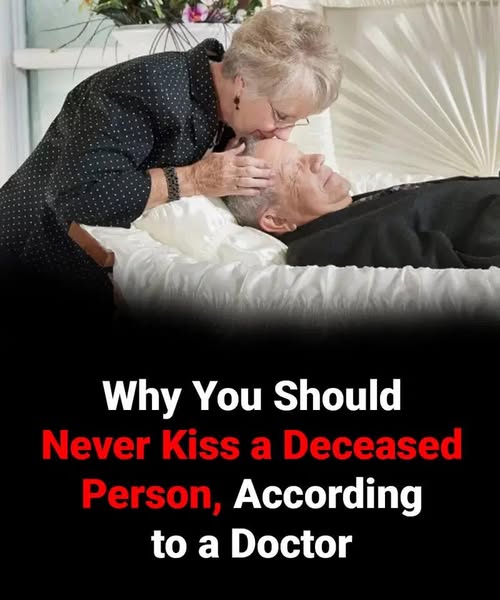Losing a loved one is among the most painful experiences a person can endure. In the depth of grief, people often act on raw emotion rather than reason. For many, the urge to kiss the deceased one last time feels like a powerful instinct—an intimate gesture of love and farewell. Yet while such an act may seem comforting in the moment, experts caution that kissing the dead carries serious risks, both physical and psychological, that are often overlooked in the fog of mourning. Recognizing these risks can help families honor their loved ones in safer ways while protecting themselves.
One of the greatest dangers lies in bacterial infection. After death, the body’s immune system shuts down completely, leaving it defenseless against microbial growth. Bacteria that were harmless during life begin multiplying rapidly in the hours following death, fueling natural decomposition. This creates an environment filled with organisms that can be dangerous to the living. A kiss near the mouth or skin—where bodily fluids may be present—can unintentionally expose a mourner to infection. What was once an ordinary exchange of microbes in life becomes a genuine health hazard in death.
Viruses pose another concern. Some, including HIV, hepatitis, and tuberculosis, can survive for hours or even days outside the body under favorable conditions. If the deceased carried an infectious disease, direct contact such as kissing could transmit pathogens through fluids or mucous membranes. Though the risk may not always be high, it is real enough for medical professionals to strongly discourage the practice. In moments of grief, few pause to consider these dangers—but the consequences can be lasting.
Decomposition itself brings additional threats. As the body breaks down, it releases gases and fluids laden with microorganisms. These byproducts can cause skin irritation, gastrointestinal illness, or respiratory problems if someone comes into close contact with them. Inhaling gases from decomposition has, in some cases, been linked to lung infections, particularly among people with weakened immune systems. While such realities may sound harsh, acknowledging them is necessary to make informed and safe choices in saying goodbye.
The risks are not only physical. Psychologically, kissing a deceased person can leave enduring scars. In the intensity of grief, the act may feel like a final expression of love, but it can also create painful, haunting memories. Instead of comfort, some are left with the disturbing image of cold or lifeless skin—or the early signs of decay. Mental health experts warn that such experiences can complicate the grieving process, deepen emotional wounds, and even contribute to symptoms of trauma.
Modern funeral practices add yet another factor: embalming. To preserve bodies for viewing, embalming fluids containing strong chemicals like formaldehyde are used. Direct contact with embalmed skin, especially through kissing, can expose mourners to toxins or trigger allergic reactions. The risk from a single brief kiss may seem small, but it is entirely avoidable when safer alternatives are available.
Importantly, expressing love does not have to involve kissing. Safer gestures can carry just as much meaning. Resting a hand gently on the forehead, holding the deceased’s hand, whispering a few words, or offering a silent prayer can provide a profound sense of connection—without the same risks. These small acts allow mourners to feel close, to say goodbye with dignity, and to safeguard both their health and their peace of mind.
The impulse to kiss the departed comes from love, but it can carry consequences that families rarely anticipate. While the desire is deeply human and entirely understandable, choosing caution is also an act of love—protecting the living while honoring the dead. Saying farewell is not only about cherishing memories of the one who has passed; it is also about ensuring that those who remain can move forward safely.
In the end, grief must walk hand in hand with self-preservation. Those final moments at a bedside or funeral are overwhelming, but they need not be shadowed by unnecessary risk. By understanding the dangers of physical contact and embracing safer ways to say goodbye, mourners can protect their health, preserve their memories, and honor their loved ones in a way that brings comfort and peace—without unintended harm.
